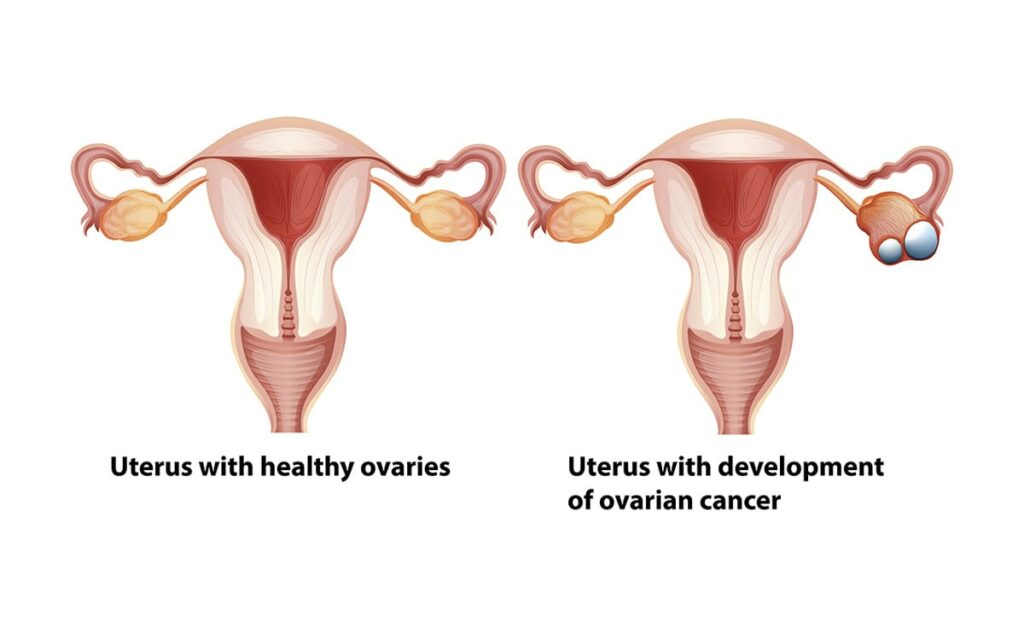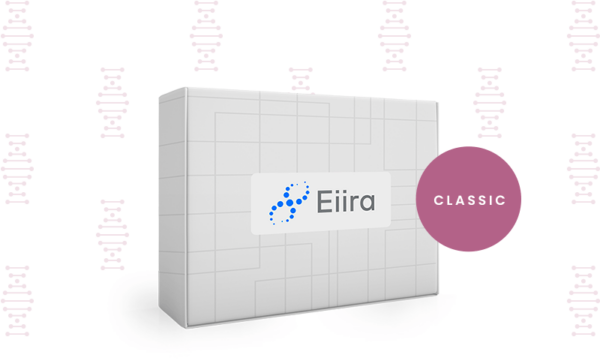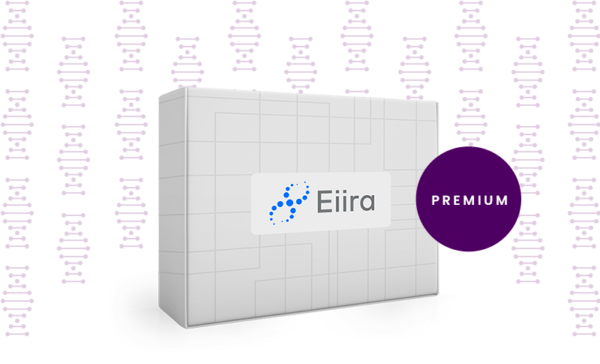
- What is ovarian cancer?
- What are the most common symptoms of ovarian cancer?
- Can ovarian cancer spread?
- Risk factors for ovarian cancer
- How common is hereditary ovarian cancer?
- Genetic mutations in ovarian cancer
- What is considered a strong family history of cancer?
- What should I do if I have a family history of ovarian cancer?
What is ovarian cancer?
Ovarian cancer is a type of cancer that starts in the ovaries, the female reproductive organs that produce eggs. It occurs when abnormal cells divide and grow uncontrollably in the ovaries, eventually becoming a tumor.
What are the most common symptoms of ovarian cancer?
Most people have no symptoms when ovarian cancer is in its early stages. When symptoms do develop, it is most likely that the cancer has advanced. The most common symptoms include:
- Feeling bloated
- Feeling full quickly when you eat
- Vaginal bleeding even after menopause
- Back pain or abdominal pain
- Regular urination
In addition, changes in bowel habits such as constipation or diarrhea and unexplained weight loss may indicate ovarian cancer.
It is always good to monitor the symptoms closely. If you have any signs for two weeks or more, it is good to consult a doctor and get medical advice.
Can ovarian cancer spread?
Yes, ovarian cancer can spread from the ovaries to other parts of the body, such as the peritoneum, lymph nodes and distant organs. The spread of cancer is known as metastasis, and the extent of metastasis can affect the stage and prognosis of the ovarian cancer.
Risk factors for ovarian cancer
- Age: The risk of ovarian cancer increases with age, like most cancers. It is most often diagnosed in older people.
- Inherited gene mutations: BRCA1 and BRCA2 gene mutations increase the risk of ovarian cancer. Genes associated with Lynch syndrome also increase risk.
- Family history: If a close relative, such as a mother, sister or daughter, has had ovarian cancer, the risk is higher. In addition, the risk may increase further if several family members are affected or if the cancer occurs at a younger age.
- Previous cancer: If you have had a history of other cancers such as breast, uterine or colon cancer.
- Hormone replacement therapy: Hormone replacement therapy (HRT), especially estrogen-only formulations, has been associated with a slightly increased risk of ovarian cancer in postmenopausal women.
- Endometriosis: Women with endometriosis, a condition in which tissue similar to the lining of the uterus grows outside the uterus, may have a slightly increased risk of developing ovarian cancer.
- Difficulty getting pregnant: Never gets pregnant or has problems getting pregnant.
How common is hereditary ovarian cancer?
The prevalence of hereditary ovarian cancer varies between different populations. Estimates show that around 15-20% of ovarian cancers may be genetic, and a significant proportion of these cases involve BRCA mutations.
Genetic mutations in ovarian cancer
Genetic mutations play a significant role in ovarian cancer, with mutations associated with genes such as BRCA1 and BRCA2. These mutations can be inherited, increasing the risk of ovarian and breast cancer. Genetic testing can identify these mutations, allowing individuals with a family history or other risk factors to make informed decisions about proactive measures, such as increased surveillance or risk-reducing surgery, to manage their cancer risk.
Although ovarian cancer is common in women, the gene mutations are inherited from either mom or dad. Not all people with inherited gene mutations are at risk of developing ovarian cancer.
What is considered a strong family history of cancer?
Ovarian cancer can run in families. If a first-degree relative of yours, such as a mother, daughter or sister, is diagnosed with ovarian cancer, then your chances are higher. The risk will also be higher if you have one or more relatives diagnosed with ovarian cancer.
What should I do if I have a family history of ovarian cancer?
If you have a family history of ovarian cancer, consult a healthcare professional, preferably a genetic counselor, to assess your specific risk. Genetic testing for gene mutations in the BRCA1 and BRCA2 genes can help determine your risk of certain hereditary cancers.
Conclusion:
Individuals with a strong family history of ovarian or breast cancer can undergo genetic counseling to assess their risk, and if deemed appropriate, they can opt for genetic testing. Eiira provides genetic tests to assess your hereditary cancer risks. You can assess your risk of ovarian cancer and make decisions after consulting a genetic counselor. The results help inform personalized risk assessments and guide preventive measures, such as increased surveillance or risk-reduction interventions.
References
Centers for disease control and prevention (CDC) - Ovarian Cancer
Medlineplus.gov - Ovarian Cancer

